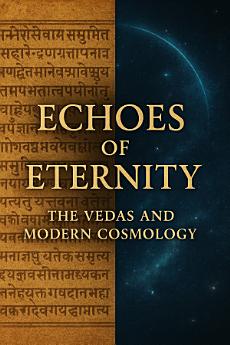Echoes of Eternity: The Vedas and Modern Cosmology
About this ebook
About This Book
• Linking Deep Traditions: Among the first books still in use today, the Vedas—especially the Rig Veda—are Driven by particle accelerators and space telescopes; modern cosmology represents the bleeding edge of scientific advancement. Combining different points of view highlights their variations and the startling similarity in how we understand the universe.
• Encouragement of Dialogue: Too often, conversations regarding science and spirituality turn into divisive arguments, “faith vs. reason," "myth vs. fact." In my opinion, a conversation that values both the empirical rigor of science and the poetic, symbolic profundity of holy books will reveal richness.
My Personal Journey: Like many, I swung between a strong sense of spiritual awe and scientific doubt. The Vedas gave me a prism to view the universe as a chilly vacuum and a place rich in order, mystery, and maybe a greater intellect. Modern cosmology tested and polished my ideas by offering data-driven insights. Though imperfectly, reconciling them has been a journey I wish to show you.
1. Vedic Worldviews: We will travel through a few songs (such as the Nasadiya Sukta), Vedic interpretations, and the conceptual frameworks they imply—that is, the cyclical character of time, the primacy of consciousness, and the interaction of cosmic forces.
2. We will discuss essential turning points like Einstein's General Relativity, Hubble's discovery of an expanding universe, and the Cosmic Microwave Background—and how these discoveries affect present ideas (Big Bang, inflation, dark matter, dark energy).
3. Points of Convergence and Divergence: Would references to the Vedas' cosmic cycles reflect the concept of an oscillating universe? Are the vague references to a primal "One" like the singularity idea? We will carefully investigate these connections, noting both the scientific and artistic settings.
4. Concerning Human Life: How could ancient or modern cosmic viewpoints change our sense of identity, ethics, spirituality, or daily life? We'll consider how realizing our cosmic roots could encourage humility, harmony, and a growing curiosity about reality that is continually deepening. Engage with this material; stay open and critical; some analogies between Vedic chants and modern science could generate goosebumps; others might feel tenuous. Real discovery includes healthy doubt.
• From both imagination and analysis, the Vedas demand interpretive flexibility with their mythopoeic approach. Modern physics needs technical accuracy, given its equations and data. Juggling the two can produce insights that are not found in each tradition by itself.
• Own Thought: See how these cosmic stories shape your own perspective as you read. Do they inspire wonder, challenge existential concerns, or create a need to know more about the cosmos and yourself?
Ratings and reviews
About the author
Dr. Harsh Vardhan brings a unique interdisciplinary approach to the study of the Vedas, combining their deep knowledge of the scriptures with practical psychological insights. This approach not only makes the profound teachings of the Vedas accessible but also applicable, allowing readers to harness this wisdom to improve their mental health and personal growth.
Forward-looking publishing company Educators Plus is dedicated to raising the caliber of instructional materials in today's fast-changing academic scene. Their goal is to equip teachers, students, and lifelong learners with readily available, research-based resources covering many disciplines. Through creative tools and a commitment to excellence, Educators Plus aims to inspire curiosity, critical thinking, and a desire for knowledge in all readers.







